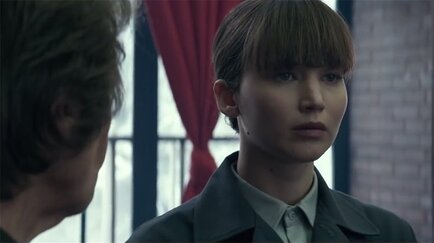Lawrence assembles a stacked cast to complement his star’s central performance and populate the rest of the world. The sparrow school is run by an imperious Charlotte Rampling, the intelligence services are led by Jeremy Irons and Ciaran Hinds, and Mary Louise Parker and Joel Edgerton serve as American foils and potential assets. All, including Lawrence and Schoenaerts, fit in admirably in the gray Russian atmosphere. The characters have spent years mastering their poker faces, a skill that Lawrence’s Dominika has to figure out quickly. Many of her adversarial scenes are against Ivan, a lecherous man and a capable spy thanks to the implacability that Schoenaerts brings to the table. Conversely, when not trying to tamp down her fears and emotions, Lawrence, fresh off of mother!, is putting herself through the wringer in yet another film that requires her to scream, this time with a Russian accent.
Red Sparrow is aiming for some kind of female reclamation project, wherein its protagonist fights back against her manipulation and exploitation in an attempt to carve out something that is unquestionably hers. There’s something of this in the broad strokes of the film, but Lawrence hurries his characters through the paces, eventually turning Dominika into a world-class manipulator of manipulators where she was a babe in the woods only an hour earlier. The progression is shakily supported, at best, and she’s assigned and promoted and forgiven at a rate that suggests the film has no better way to move its plot forward than to have a superior simply state that the film is moving forward. Jo Willems’ cinematography, with all its sharp reds and striking close-ups, can’t do all the work itself. Red Sparrow trusts that the viewer will accept that Lawrence can will herself to a desired result. A better film would’ve trusted her to convey more of the desperation and recklessness appropriate for a rookie double agent who is not in actuality the cinematic reincarnation of Elizabeth Jennings. C

 RSS Feed
RSS Feed